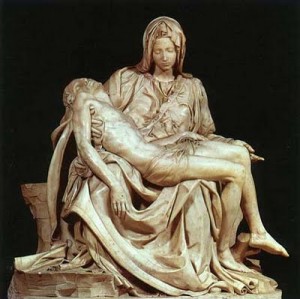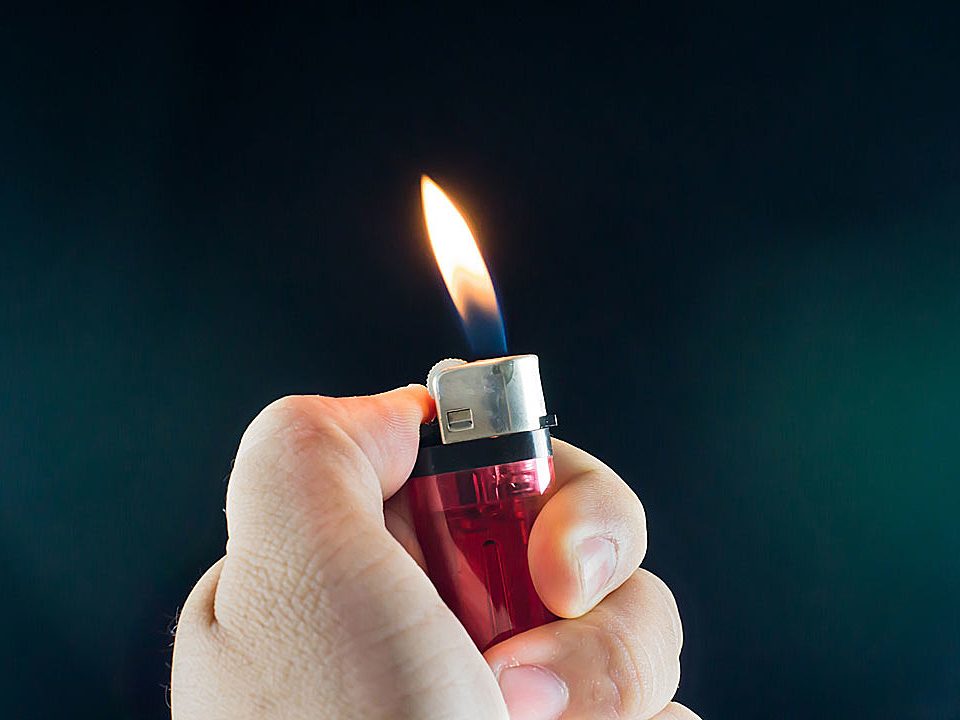Prayer In A Bottle
 Last week, on Christmas Eve morning, David Myers, the 21 year old son of one of our weekly adorers, Ceil Myers, died as a result of an auto accident. David was home from college for the holidays. He was due to graduate from college this coming semester, and scheduled to begin medical school in the fall.
Last week, on Christmas Eve morning, David Myers, the 21 year old son of one of our weekly adorers, Ceil Myers, died as a result of an auto accident. David was home from college for the holidays. He was due to graduate from college this coming semester, and scheduled to begin medical school in the fall.
There is rarely a time when there is greater suffering then when a loved one is unexpectedly taken from you, with no warning or time to prepare. It could happen to any of us, and it would start with a knock on the door or a telephone call that would forever change the direction of our lives.
My first experience with a sudden unexpected death was when I was 13 years old. I was sitting in the family room at home watching television with a couple of my brothers, and my dad came into the room and told us that he had just received word that one of our cousins, Tommy LaHood, was in the hospital. We turned off the television and knelt down and prayed a Rosary for Tommy. At that time, we were not aware that he had already died as a result of an accident. He was 11 years old when he died.
The following day (in the evening) my parents and I went over to my cousin’s house to visit with his family. I went with my parents because I was good friends with Tommy and his older brother, Harry. While my parents were in the house, Harry and I sat outside on lawn chairs in the front yard. I tried to keep a conversation going, but there were several times when he stopped talking, put his hands over his face, and started crying. Every time he cried he told me, “Harry, I hope this never happens to you.” There was nothing I could do or say to comfort him.
A couple of years ago, some friends of our family lost their college age son when he was killed in an automobile accident. The son had everything going for him. He was good looking, intelligent, charming, and fun to be with. On top of that, he had great love and affection for his parents and sisters. One morning at around 5 a.m., there was a knock on the door of his parents’ house. It was someone from the coroner’s office who had driven out to the house to deliver the bad news.
Georgette and I went over to their house as soon as we heard the news. As you would expect, the family was devastated. Several months later, I stopped by to see the boy’s father and, although he tried, he was unable to hold back the tears. It’s been over two years now and the family is still suffering from the open wounds that were created in their hearts on that terrible day when the life of their son (and brother) was taken from them.
For reasons unknown to us, after the sin of Adam and Eve, God decreed that without suffering, there is no salvation. This is a profound mystery that has confounded even the greatest of the saints and doctors of the Church. It is axiomatic that when we turn away from suffering, we turn away from Jesus Christ.
Why was it that Jesus had to endure suffering that was so intense that He literally sweat blood from the pores in His skin? Why did He allow His mother to experience the same suffering He experienced? With one command, He could have eliminated the suffering He and His mother were going through; but instead, He willingly chose to lovingly embrace the suffering. Why? Because He knew that it was necessary for Him to suffer before the gates of Heaven could be opened for all of us.
Without suffering, there is no salvation. As devout Catholics, we should do everything in our power to embrace the suffering God has planned for us. To avoid suffering is to avoid salvation.
I’m not saying we should ask for suffering or seek it out. What I am saying is that when the opportunity presents itself, we need to welcome and embrace it in the same way our Lord and our Lady welcomed and embraced the suffering that came their way.
What I am suggesting cannot be accomplished without divine assistance. When unimaginable suffering is thrust upon us, we are not humanly capable of effectively dealing with it on our own. We need extraordinary grace to be able to get through (and grow from) unimaginable suffering.
A person who has lost a loved one as a result of an accidental death is destined to suffer from deep emotional wounds that will never be completely healed. Although the emotional wounds will eventually develop scabs (like physical wounds), the scabs will repeatedly be torn off by future events, especially in the first few years after the death. When the favorite song of the deceased person is heard on the radio, the wound will be torn open again. When his birthday (or a special anniversary) arrives, the wound will start bleeding again. When the picture that is hanging on the wall is seen (showing his contagious smile), the tears will start flowing again. When his voice is heard while his image plays on a video recording, a sword will again be plunged into the heart.
So what are we expected to do for the person who has been wounded by the sudden loss of a loved one? We have an obligation to assist our fellow Catholics in their time of suffering and sorrow by practicing two of the spiritual works of mercy: “comfort the sorrowful” and “pray for the living and the dead.”
You may be familiar with the song, Time in a Bottle, by Jim Croce. It was popular during the 1970’s when I was a teenager. In the song, the lyrics start out with: “If I could save time in a bottle, the first thing that I’d like to do, is to save every day ‘til eternity passes away, just to spend them with you.”
Rather than being able to save time in a bottle, what if we were able to save prayer in a bottle – in the form of a healing ointment that could be used by people who have been wounded because of the loss of a loved one? When properly applied, the healing ointment would help to extract and remove the grief, the guilt, the anger, and the despair of the wounded person. The ointment would also have the power to renew hope, strengthen faith, and bring comfort to the wounded person.
If we had the power to bottle-up and set prayer aside to be used at a later time to heal those who are wounded, we would want to use the most powerful formula possible to strengthen and enhance the healing properties of the ointment. So what would be the most powerful prayers to bottle-up?
It would have to be the Holy Sacrifice of the Mass and the Rosary. By bottling-up these prayers for those who are wounded, we would be calling upon the two individuals who were chosen by God to suffer for the sins of all of mankind. Those individuals (the Son of God and the Mother of God) had the ability and capacity to not only love in a perfect way, but to also suffer in a perfect way.
Although we don’t have the ability to save prayer in a bottle, we do have the ability and power to use prayer, in real time, to assist in the healing process.
So here’s what I have done to assist in the healing process of some of my fellow Catholics. I have marked off one day each month over the next 12 months to offer up a Mass and a Rosary for the soul of David Myers, his parents, Cecilia and Clifford Myers, his brothers, Peter, John, and Thomas, and his grandparents. I would like to ask that 30 other fellow Catholics do the same. We would then have someone praying for the Myers’ family the equivilent of every day for the next year.
You don’t need to let me know that you’re on board with me on this, but I would suggest that you let the Myers’ family know that you’re praying for them. You can find their address in the telephone book or on the obituary page for December 25, 2009, at pjstar.com. Because you are a member of the Myers’ Catholic family, it would be an act of charity and kindness for you to show them that you are willing to assist them with your prayers.
God has given you the power to heal. The first step in exercising that power is to make the commitment in writing, and then follow through on your commitment. It’s “the Catholic way” to start out the new year.


